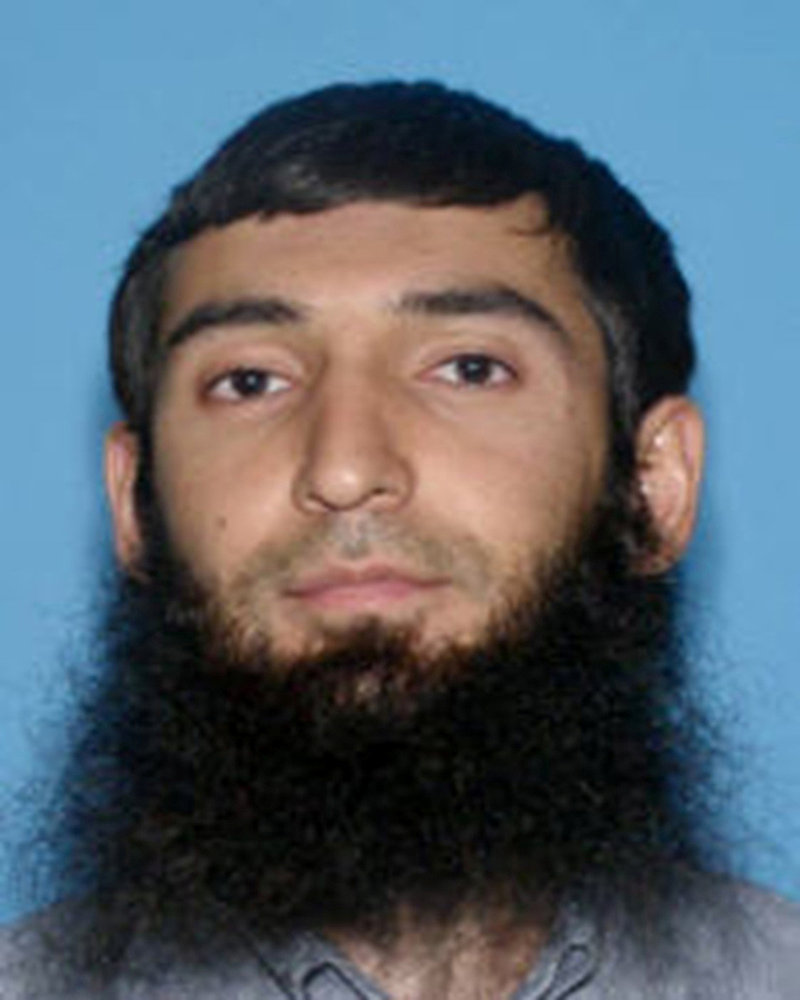
By Gina Cherelus and Barbara Goldberg
NEW YORK (Reuters) – An Uzbek immigrant suspected of killing eight people in New York City by crashing a truck through a crowd on a bike path followed online plans from Islamic State and left a note saying the militant group would “endure forever,” police said on Wednesday.
Police said they had interviewed Sayfullo Saipov, 29, who is in hospital after an officer shot him, ending the riverfront rampage. They said he appeared to have been planning the attack for weeks and that investigators recovered notes and knives at the scene.
“The gist of the note was that the Islamic State would endure forever,” New York Deputy Police Commissioner John Miller told a news conference. “He appears to have followed almost exactly the instructions that ISIS has put out on its social media channels to its followers.”
The attack was the deadliest on New York City since Sept. 11, 2001, when suicide hijackers crashed two jetliners into the World Trade Center, killing more than 2,600 people. A further 12 people were injured, some critically, in Tuesday’s attack.
Similar assaults using vehicles as weapons took place in Spain in August and in France and Germany last year.
Saipov allegedly used a pickup truck rented from a New Jersey Home Depot Inc store to run down pedestrians and bicyclists on the path before slamming into the side of a school bus.
He then exited the vehicle brandishing what turned out to be a paint-ball gun and a pellet gun before a police officer shot him in the abdomen.
Saipov reportedly lived in Paterson, New Jersey, a one-time industrial hub about 25 miles (40 km) northwest of lower Manhattan.
TRUMP: ‘SEND HIM TO GITMO’
U.S. Senator Lindsey Graham urged authorities to treat Saipov as an enemy combatant, a move that would allow investigators to question the man without him having a lawyer present.
U.S. President Donald Trump said he would be open to transferring Saipov to the military prison at Guantanamo Bay, Cuba, where other suspects including alleged Sept. 11 plotters are held.
“Send him to Gitmo. I would certainly consider that,” Trump told reporters. “We also have to come up with punishment that’s far quicker and far greater than the punishment these animals are getting right now.”
New York State Governor Andrew Cuomo said that Saipov had been radicalized while living in the United States.
The majority of the 18 Islamic State-inspired attacks carried out in the United States since September 2014 were the work of attackers who developed radical views while living in the United States, said Alexander Meleagrou-Hitchens, research director at George Washington University’s Program on Extremism.

Sayfullo Saipov, the suspect in the New York City truck attack is seen in this undated handout photo obtained by Reuters November 1, 2017. New York PD/Handout via REUTERS
ARGENTINE FRIENDS AMONG DEAD
Six victims were pronounced dead at the scene and two more at a nearby hospital, Police Commissioner James O’Neill said.
Five of the dead were Argentine tourists, visiting New York as part of a group of friends celebrating the 30th anniversary of their high school graduation, the government there said. Belgium’s foreign minister said a Belgian citizen was also among those killed.
New York City Mayor Bill de Blasio said police will be out in force to protect the city’s marathon on Sunday, one of the world’s top road races, which draws some 51,000 runners and 2.5 million spectators from around the globe.
A pair of ethnic Chechen brothers killed three people and injured more than 260 with homemade bombs at the 2013 Boston Marathon, memories that were stirred for some runners by Tuesday’s attack.
“It was unsettling to hear the news,” said Neil Gottlieb, 48, who crossed the finish line in Boston shortly before the blasts and plans to run the New York City race on Sunday. “You simply can’t stop a truck and that’s the issue in my mind and my wife’s mind.”
Uzbekistan’s President Shavkat Mirziyoyev said his government would do all it could to help investigate the “extremely brutal” attack.
Last week an Uzbekistan citizen living in Brooklyn was sentenced to 15 years in prison for conspiring to support Islamic State.
Saipov had not been the subject of any U.S. investigation, Miller said. He had been in contact with a person who was the subject of a Federal Bureau of Investigation probe, a U.S. government source told Reuters on Wednesday.
Trump, who has pressed for a ban on travelers entering the United States from some predominantly Muslim countries, criticized the U.S. visa system, blaming Democrats including U.S. Senator Chuck Schumer of New York for the diversity visa system that admitted Saipov. He said he wanted a “merit based” immigration program.
“We do not want chain migration, where somebody like him ultimately will be allowed to bring in many, many members of his family,” Trump told reporters.
Schumer shot back at Trump: “Instead of politicizing and dividing America, which he always seems to do at times of national tragedy, (Trump) should be bringing us together and focusing on the real solution, anti-terrorism funding, which he proposed to cut in his most recent budget,” Schumer said on the Senate floor.
(Additional reporting by Jonathan Allen and Melissa Fares in New York, Joseph Ax in Patterson, New Jersey and Mark Hosenball and Tim Ahmann in Washington; Writing by Scott Malone; Editing by Paul Tait and Bill Rigby)






